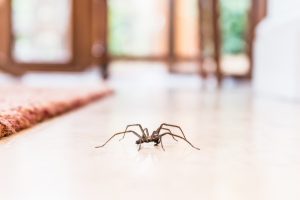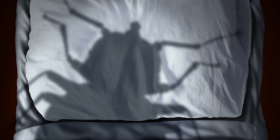Of the 3,500 species of cockroaches in the world and the 55 species found in the United States, the German Cockroach is the most common household roach pest in Arkansas. Even the cleanest of homes are at risk for an infestation. Roaches can often be brought into the home by way of cardboard boxes and grocery bags, used appliances or furniture, plumbing in apartment buildings, or clothing from school or work.
How to Identify an Infestation
Roaches are most active at night time, foraging for food, water, and mates. During the day they prefer to hide in cracks, crevices, and dark places where they are most likely to find warm and humid conditions. During the colder months, they like to hole up in places like behind the baseboards in your home, drawers, cracks around closets, under the sink, stove or refrigerator. You may notice one or two running around your sink or kitchen counters in the evening, which can alert you to a small problem. However, if you see them during the day, it can be an indication of a much bigger infestation.
Reproduction and Why it Matters to You
The warmer months of the year are the chief breeding time for roaches. Female roaches can produce a large number of eggs approximately every 6 weeks, and roaches have the shortest time from hatching to sexual maturity, resulting in rapid population growth. The eggs are carried in a purse-like capsule that can hold 30-48 eggs at a time, taking up to 28 days to hatch. This means that one female roach can be responsible for the birth of up to 10,000 more roaches in one year, assuming two generations are descended from her. Some experts say that one roach can be responsible for up to 6 generations in one year — that’s 30,000 roaches from one roach!
How to Control or Prevent a Major Infestation
When it comes to prevention, the first thing the experts say to do is clean, clean, and clean again. Like we stated before, there are several situations where even the cleanest of homes can end up with a roach infestation, despite all efforts to avoid it. However, there are some ways in which you can lessen the chances of an infestation taking over your home:
- When cleaning your home, we don’t mean you’re typical after-dinner clean-up. We mean pull out the stove, fridge, and any other appliances around the kitchen so you can clean under, behind, and around the areas that roaches are most likely to be found hiding. They are particularly attracted to crumbs, grease, and smells left behind by spills and they love to hide in the warm, humid conditions these appliances supply. Using disinfectant spray on all countertops and surfaces, and sweeping your kitchen nightly can help to control a roach population because they will be less likely to find food or water to sustain them.
- Limit all eating to one section of the house in order to control the likelihood of the spread of an infestation to other areas of the home.
- Empty out all your cabinets and clean them thoroughly. Also, if possible, place all food in airtight containers, as roaches can sometimes fit through the cracks of cardboard boxes, and also because cardboard boxes can be known to spill. Another tip for pet owners is to pick up all food bowls each night and clean them out or wrap them with the remaining food in plastic bags before bed, to prevent accidentally feeding the problem
And of course, the number one way to control or prevent a roach infestation is to have a professional get involved in exterminating the problem. Our team at Clark Exterminating understands how important it is to keep and maintain a clean home, free of any type of bugs in order to establish a safe environment for you, your family, and your guests.
If you are having a roach problem, make sure to contact us online or by phone, today. Remember, “The Bug Stops Here!”
Little Rock: 501-228-0322
North Little Rock: 501-758-0322
Conway: 501-329-0396
Benton: 501-776-1388
Bryant: 501-847-1388
Jacksonville/Cabot: 501-843-1322
Hot Springs: 501-623-2335



